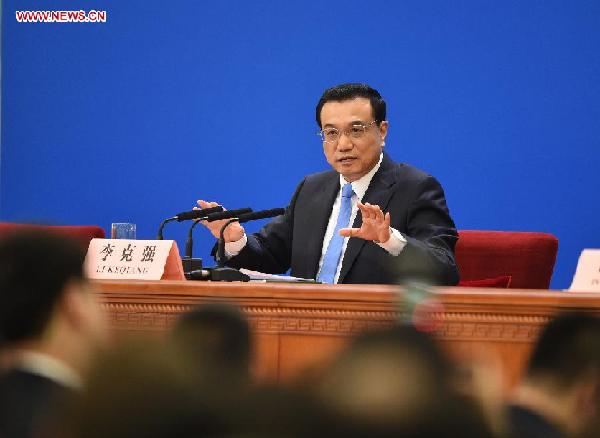China set for rapid growth of cloud computing and Internet+
- By Eugene Clark
 0 Comment(s)
0 Comment(s) Print
Print E-mail China.org.cn, April 6, 2015
E-mail China.org.cn, April 6, 2015
|
|
|
Chinese Premier Li Keqiang speaks at a press conference after the closing meeting of the third session of China's 12th National People's Congress (NPC) at the Great Hall of the People in Beijing, capital of China, March 15, 2015. [Xinhua/Xie Huanchi] |
Premier Li Keqiang, speaking at the National People's Congress session in 2015, announced a new Internet+ (Internet Plus) policy, with the goal being to "integrate mobile Internet, cloud computing, big data and the Internet of Things with modern manufacturing to encourage the healthy development of e-commerce."
This seems consistent with the recent calls favoring the "new normal," in which China will strive for slightly lower, but higher quality, growth. E-commerce and B2B commerce will play a vital role in achieving the growth as well as enhancing existing manufacturing through greater penetration and uptake of cloud computing, continued growth of m-commerce, use of big data and the "internet of things", i.e. linking various technologies together.
Cloud computing involves a shift from computing systems that are on-site to a utility model in which shared and scalable technology infrastructure, software applications and business processes are provided over the Internet for a fee.
In a cloud environment, it is possible for servers, operation systems, application software, development, upgrade, maintenance, security, backup, disaster recovery and other business functions no longer reside inside the business or government IT department. Instead, they are delivered via the internet in the cloud.
Parallels in the development of cloud computing are similar to the shift that occurred decades ago as manufacturing plants switched from a business model where each provided their own power sources (e.g. a generator) to a utility model where the power is provided by a general shared utility located remotely and delivered as required and for a fee to the particular business.




 Add your comments...
Add your comments...

